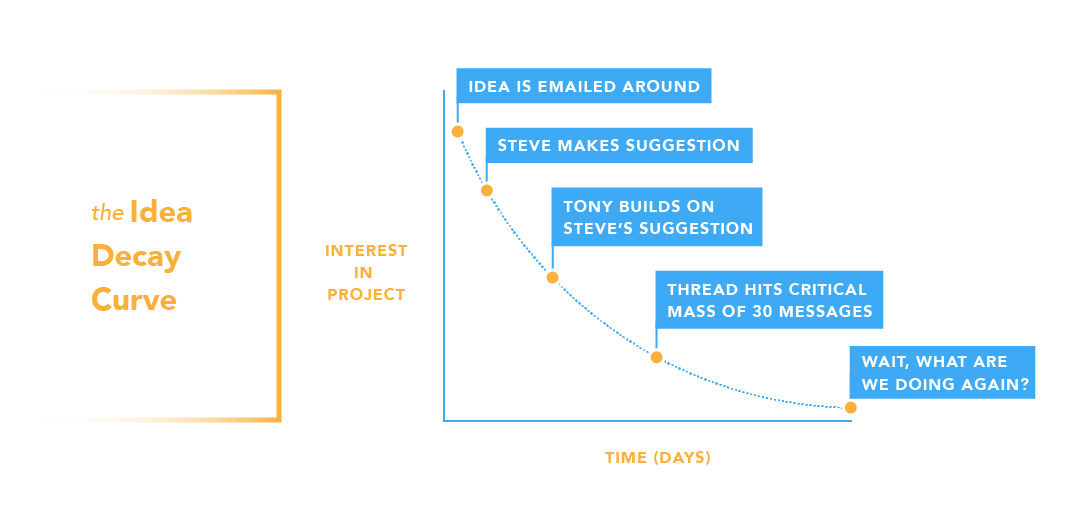The idea half-life: How great work decays across channels
Or How I Learned To Stop Worrying And Love the Abandon E-Mail Bomb
Think of ideas as having half-lives. They start out radiating excited energy that, over time, starts to lose steam as the idea gets pulled through the rigors of execution. It's an almost natural decay process that takes place, balanced only by the gravity of the idea and the momentum of the team's belief in it.
Nothing facilitates that decay process more quickly than e-mail chains. The endless cycle of edits, half-hearted two-cents input from everyone on the chain, and unstructured approvals can end up diluting a project to the point that it can no longer fairly be called an execution of the idea that spawned it. By the fifth or so round of feedback, the same energy and passion that was there when the project first began is gone.
That's one of the problems that drove us to create Quip in the first place. We were tired of seeing the initial excitement around a new idea become weighed down by emails, meetings, check-ins, and inefficient internal processes. And we wanted to make something that helped people work together smoothly, because great things are born from collaboration — like the Declaration of Independence and the whole Lennon-McCartney catalog.

So in order to make our work more agile, efficient, and collaborative, here's how we've built Quip to help people keep that new-project passion burning at every stage:
We designed the Living Document.
There's no better way to stave off idea decay than to keep documents alive. In the past, ideas sat in documents in your drive (or if you go far back enough, on your desk) when you weren't around, waiting to be edited. The Living Document updates in real time, fosters communication between you and your team with a chat feature and @-mentions, and alerts your smartphone when a task has been assigned to you. It helps you and your team hold each other accountable and allows you to bounce ideas and ask questions all in one place, where the work is actually happening, giving everyone the chance to contribute to it and keep that momentum rolling.
We made working offline easier than ever.
Moments of brilliance can strike anywhere—and for some reason they just happen to like striking while you're disconnected on a plane or in the subway. That's why we were eager to tackle one of the biggest issues with cloud-based software: its reliance on internet connection. Quip's unsaved changes indicator keeps anything you've created locally secure, and once an internet connection is established, those changes are automatically synced.
For those ideas that come to you in dreams, only to be forgotten in the morning — well, we're working on that one.
We created team collaboration tools that actually work.
From apps that order food to online shopping apps to fitness apps, the expectation is that it will work right out of the box (so to speak), with a mild learning curve and intuitive interface. For us, these are especially important, because we know that clunky applications can grand ideas and the team spirit they spawn just as quickly as e-mail.
That's why we purposefully configured Quip to be easy-to-use. The document you're looking for is cleanly organized in an easily-accessible folder. The specific person you're looking to direct message is just a click away—accessible within the Quip client itself, so you don't have to toggle between different windows or applications to speak with someone.
We're here to help everyone in your organization get the most of their ideas. See what's right for you and sign up today!
